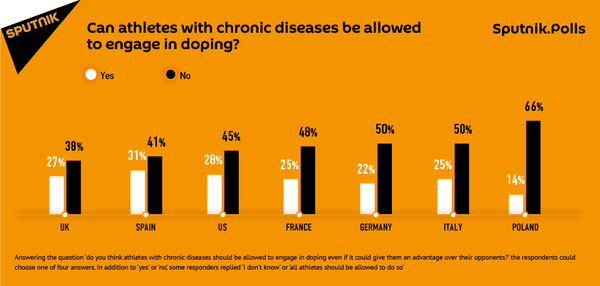MOSCOW (Sputnik) — The survey conducted by Ifop on October 22 — October 26 among 7,043 adults showed that 50 percent of Germans and Italians, 66 percent of Polish nationals oppose the practice. Meanwhile, 48 percent in France and 45 percent in the United States are also against the doping use by such a category of athletes.
In September, Fancy Bears hacker group published World Anti-Doping Agency (WADA) documents, which revealed that many prominent athletes including Rafael Nadal, Simone Biles, Serena and Venus Williams, had been allegedly using banned drugs while using statements about serious diseases as an excuse.
The poll's release coincides with Canadian sports law professor Richard McLaren's presentation of the second part of the report on the alleged doping abuse in Russia.
In July, a WADA commission led by McLaren presented a report based on the investigation results, in which Russia was accused of running a state-wide doping program, urging the International Olympic Committee (IOC) to consider a blanket ban on the entire Russian team. The IOC instead opted to let individual sports federations decide on the matter.
As a result, the International Association of Athletics Federations (IAAF) banned Russian athletes from taking part in international competitions including the 2016 Summer Olympics. The International Paralympic Committee (IPC) later banned all Russian Paralympic athletes from the 2016 Summer Paralympics and the 2018 Winter Games.
Sputnik launched the Sputnik.Polls project in January 2015 to conduct polls in Western Europe and the United States in cooperation with the leading research companies Populus, Ifop and Forsa. The project involves regular surveys on high-profile social and political issues.



